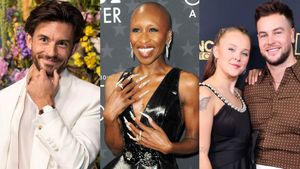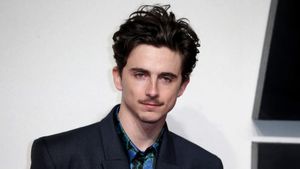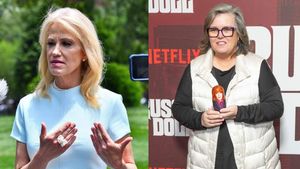Dr. Hugh Culber (Wilson Cruz) is first seen in season 2 of Star Trek: Discovery naked, afraid, and fleeing for his life from forces seeking to destroy him.
Culber is called "a monster" by May, an inhabitant of the mycelial network -- a fictional form of subspace that branches out just beneath our own universe in the sci-fi television show. He is dangerous and must be killed, May has asserted to crew members of the USS Discovery -- the spaceship where Culber once served as its gentle physician.
Homophobia does not exist in the 23rd century, where Discovery is set -- although tensions among alien races like the Klingons and Kelpians have provided parallels for humanity's various forms of discrimination. Yet it may be jarring for viewers to witness the hellish journey of Culber through the first two seasons of the CBS All Access streaming series.
The Starfleet officer made history by becoming one of the first gay characters in the long-running Star Trek franchise, alongside the partner he loves, Lt. Paul Stamets (Anthony Rapp). This distinction garnered both actors a cover of The Advocate. But the triumph of this visibility seemed short-lived. After his introduction to viewers, Culber was brutally murdered by an enemy combatant. Fans protested. The death seemed to add Culber to the many victims of the "Bury Your Gays" trope that continues to plague television and other media. Anticipating the outrage, Discovery producers assured viewers that Culber would return.
And return he did. As is revealed in the "Saints of Imperfection" episode of season 2, Culber survived his attack, but not in a way that was immediately apparent to viewers -- or easily explainable, for that matter. Essentially, Stamets, in a farewell kiss, unwittingly transferred the energy of his dying lover to the mycelial network, which Stamets himself was connected to at the time. There, sentient beings made up of fungus perceived Culber as an alien enemy and a threat to their own survival.
Thankfully, Stamets finds and is able to rescue Culber from his agony in a storyline that conjures the Greek myth of Orpheus, who descends into the underworld to find his love -- a romantic journey that Cruz described as a "rare and beautiful experience" for out actors in gay roles to inhabit.
"It's nice to be among the living," said Cruz, whose character, after going to death's door and back, has been upgraded from recurring to a series regular in the second season. Cruz feels "gratitude" to the show's writers and producers for showing the complexity of Culber's journey. "They really invested real time and effort in telling the story. It wasn't just something that was glossed over and treated in a minimal way. This relationship was taken seriously and the circumstances had consequences," he said.
Culber does not return from the mycelial network unscathed. Although his body is sounder than ever thanks to a futuristic form of genetic reconstruction -- it's newly formed from his DNA -- the gay doctor suffers mentally from his traumatic experiences. Once even-tempered, he lashes out at his partner, Stamets, after his resurrection and moves out of their shared quarters in last week's episode. Afterward, he begins a brawl in the Discovery mess hall.
To prepare for Culber's dramatic transformation and storyline, Cruz immersed himself in culture related to trauma. He listened to the music of folk singer Patty Griffin as well as the audiobook for Cormac McCarthy's harrowing dystopian novel The Road, which was "useful in imagining desperation and the bleakness of the end of the world and end of existence."
The actor, 45, also adjusted his workout routine to become "bigger and stronger and leaner" to portray a "brand-new body." Cruz wanted Culber "to feel like he was driving a brand-new car and didn't quite have a handle on it."
"I needed the audience to understand that this person was broken by what had happened to him, so that when we did get him back onto this plane that they understood the real consequences and circumstances that he was living under," Cruz explained.
Cruz, due to the possibility of revealing spoilers, is hesitant to delve into the particulars of how Culber deals with his trauma. But for those concerned with his troubling behavior in the season thus far -- including the rejection of his partner, Stamets -- Cruz stressed in both vague and specific terms that this is just the beginning of a healing process that will be explored in more detail in future episodes.
"This separation from Stamets is really about getting enough space so that he can be selfish enough in this processing to really concentrate on what he's feeling and what he's not feeling and what he eventually wants to do," Cruz said.
While Discovery does not directly address hate-based violence in its storyline around Culber, the gay character's experience with violence, demonization, and trauma is all too familiar for LGBTQ people in the real world. It speaks to a real-life crisis. Hate crimes, including those against gay people, jumped 17 percent in 2017 from the previous year, the FBI reports. There were at least 29 acts of fatal violence against trans people in 2017 -- the most ever recorded.
Members of the LGBTQ community are also disproportionately impacted by mental health conditions like depression and post-traumatic stress disorder -- in part due to the stress related to fear of violence and discrimination, according to the National Alliance on Mental Health.
When the season is over, Cruz hopes his character can provide "an example of resilience" for LGBTQ people who have survived violence and trauma. "That's who we are as a people," he said. "If you look at the history of LGBTQ people in this country and also around the world historically, there's example after example of when we have been attacked and murdered and marginalized and erased, and we find a way out of that."
Cruz points to the worst of the AIDS epidemic, which he lived through as a teenager, as a potent example of how LGBTQ people have practiced resiliency in the face of society's fear and hatred. "Our answer to that eventually was, OK, how do we take care of ourselves and get ourselves to a healthier place so that we can continue our fight towards equality? And for me that stands as an inspiration daily."
During the AIDS crisis, "we found our allies and we found strength in each other and the people who love us in order to survive something that was giving us every indication was going to decimate and kill us off," Cruz added. "I do think about Culber in terms of that as well -- that he had been killed and mourned and people were ready to move on and he found a way of finding himself with another chance."
Culber's journey -- and the ability to have another chance -- resonates with Cruz, who has had to practice resilience in his own life and career. Nearly 25 years ago, he portrayed Rickie Vasquez on My So-Called Life, becoming the first openly gay actor to portray a gay role on a major American television series. However, this historic representation had consequences. Cruz saw his opportunities dry up in an industry that was not ready to embrace openly LGBTQ actors -- particularly LGBTQ actors of color.
"I feel like I've been counted out a few times," admitted Cruz. However, "I feel like I still had something to say and I think this show is giving me the opportunity to do that. But you know, I've had to deal with my own personal struggles and find a way to support myself until the opportunity to do what I love presented itself. And sometimes that meant putting myself out there."
Notably, Cruz helped land his role on Star Trek: Discovery by reaching out to its co-creator, Bryan Fuller, who he had worked with previously on Pushing Daisies, on Twitter. He has also set his sights higher, pushing himself to be considered for the role of Marvel's first gay superhero after news that the studio was considering green-lighting a film about one.
"I'm putting fewer limitations on my expectations for myself than I ever have in my career because I feel like I believe in myself. I feel like I've tested and I've done a pretty good job up until now," he said.
Cruz will also continue to advocate to do "even more" on Discovery, where he hopes his character provides a guiding light for those suffering from mental health issues.
"I think when people are feeling the effects of PTSD or depression, it can feel endless and like a dark pit that you think you may never see yourself out of," he said. "I think it's important to see and be reminded that those moments can be and are temporary -- and that we can see our way out of that darkness to a better day, a better time."
A new episode of Star Trek: Discovery airs Thursday at 5:30 p.m. Eastern on CBS All Access.




































































Charlie Kirk DID say stoning gay people was the 'perfect law' — and these other heinous quotes